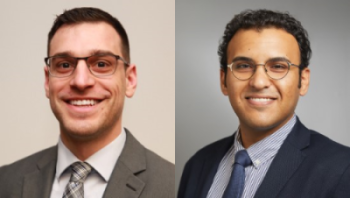Letter from Neurology Chief Residents

Christopher Caracciolo, DO
Mohamed Kandil, MBBCh
Welcome to the University of Maryland Neurology Residency Training Program!
Our residency provides exceptional clinical training within the broad spectrum of neurology in a wide variety of clinical settings.
During our residency we are involved in the care of patients at many sites of the University of Maryland Medical System, including the inpatient sites of the University of Maryland Medical Center (UMMC), University of Maryland Rehabilitation and Orthopedic Institute (UMROI), The Shock Trauma Center (STC), and the Baltimore VA Medical Center as well as the outpatient centers of the University of Maryland Neurology Care Center and The Johns Hopkins Hospital. Apart from a short drive to get to UMROI and Johns Hopkins, all the other sites are on the UMMC campus.
Being part of a large medical center affords us incredible learning opportunities. We are a Comprehensive Stroke Center, have an active Epilepsy Monitoring Unit and epilepsy surgery program, a 22-bed Neuro Critical Care Unit and an inpatient General Neurology service through which we see a myriad of neurologic conditions. In addition to the primary neurology and consult services, we are closely involved in STC, the nation's only integrated trauma hospital, which offers a dedicated neurotrauma and spinal cord unit and the largest annual volume of trauma patients nationwide.
Our rehab hospital, UMROI, is the largest comprehensive rehabilitation care center in the state of Maryland and an integral part of continued care for our neurologic patients as well as other patients with acute rehab needs. We care for an incredibly diverse patient population presenting with a wide array of neurological disease in both the inpatient and outpatient settings.
We serve patients living in the surrounding neighborhoods of West Baltimore which represent some of the lowest median household incomes across the city. Additionally, as a tertiary care center, patients travel from throughout the state and the region for neurological care at UMMC. Our hospital system comprises over 15 medical centers and will often transfer patients to UMMC for advanced neurological care.
Training at University of Maryland empowers residents to treat patients with neurological diseases, both common and rare, across an expansive array of socioeconomic backgrounds. In doing so, we help to address disparities in access to neurological care.
Clinical rotations at UMMC, the Baltimore VA and UMROI, as well as subspecialty outpatient exposure, provides for a comprehensive neurology residency experience.
Graduates from the University of Maryland have a reputation for being expert neurologists, largely as a result of our faculty who are highly invested in resident education. Our faculty are passionate teachers and have deep interests in basic science and clinical research, medical education and addressing gender and health disparities within neurology. There is strong support of resident involvement in all of these areas.
Each year, residents have an opportunity to share their scholarly projects with the department at the annual poster session and research symposium, as well as at the American Academy of Neurology (AAN) Annual Meeting and other national neurology meetings. Senior residents are given dedicated time off and financial support to travel to the annual AAN Meeting.
We are extraordinarily fortunate to have Dr. Carolyn Cronin as our program director Dr. Peter Jin and Dr. Sarah Fredrich as our associate program directors, and Dr. Peter Crino as our department chair. Dr. Cronin, Dr. Jin, Dr. Fredrich and Dr. Crino care deeply about our education and our experience within the neurology department, taking an active role in shaping our curriculum. In the past few years Dr. Crino has added neuro-oncology faculty to our department which has further expanded our education.
To help facilitate our development as neurologists, everyone is paired with a faculty advisor who helps the resident identify and plan career goals. Each new resident is also paired with a senior “buddy” to help facilitate the transition to neurology.
Our residents come from a variety of backgrounds and have equally varying interests and professional goals. Historically, most residents pursue additional sub-specialty fellowship training after residency. We have robust sub-specialty divisions and associated fellowship opportunities, including Vascular Neurology, Neurophysiology (both EEG and EMG tracks), Epilepsy, Movement Disorders, Neuro Critical Care, and Neuroimmunology/MS led by expert faculty who provide strong education and mentorship. For these reasons, many residents choose to continue their training here at the University of Maryland, others have also gone to top fellowship programs throughout the country.
Baltimore is a vibrant and affordable city with excellent restaurants, local microbreweries, cocktail bars, eclectic museums, and exciting sporting venues to enjoy. Its location within a geographically diverse state, along with proximity to both Washington, DC and Philadelphia, offers many additional activities. A short drive takes you to scenic landscapes on the Eastern Shore and western Maryland, great hiking in nearby state parks as well as the Appalachian Mountains, and easy access to the beaches! The city and surrounding suburbs have many beautiful neighborhoods to meet the needs of our residents, while the Baltimore-Washington, DC metropolitan area provides excellent access to many job opportunities for graduating residents and/or their significant others. Our program size is small enough that residents closely bond but also large enough to allow for plenty of time outside of work together. We have recently enjoyed activities such as trivia nights, happy hours, boating, attending Orioles and Ravens games as well as BBQs hosted at residents’ homes and an annual “Friendsgiving” potluck.
We hope that this has given you a glimpse into life at the University of Maryland Neurology Residency program. If you have any questions at all, please do not hesitate to contact us at neurochiefs@som.umaryland.edu.
Chris Caracciolo, DO
Mohamed Kandil, MBBCh


